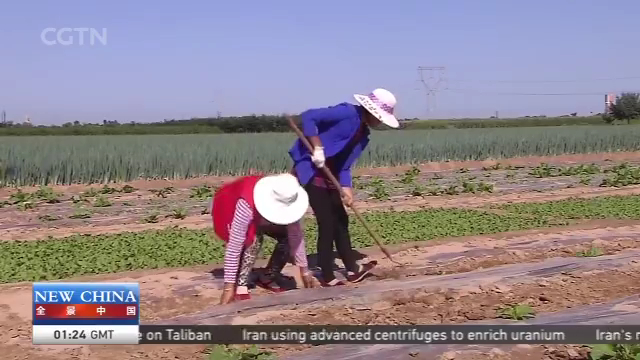
15:22, 09-Sep-2019
Celebrating 70 Years of New China: People's Republic of China over the past seven decades
Updated
15:43, 09-Sep-2019

The People's Republic of China has experienced three major eras in the past 70 years. It implemented socialist reform during the new China era, leading to an era of socialist construction. In 1978, China started the new era of economic reform and opening up, building a socialist society with Chinese characteristics. Our reporter, Wang Hui, explains.
"The central government of the People's Republic of China is established."
The announcement by Chairman Mao signals a new era for China. After 28 years of war, and under the leadership of the Communist Party of China, the country defeated Japanese invaders, overturned the Kuomintang reactionaries, and brought about a new democratic revolution. The People's Republic of China was finally established on October 1st, 1949.
PROFESSOR ZHAO CHAOFENG SCHOOL OF MARXISM, BEIJING NORMAL UNIVERSITY "The establishment of the new China ended the fight against imperialism and feudalism in China, abolished unequal treaties imposed by imperialist countries as well as their privileges in China. It was a great leap from years of Feudal autocracy to democracy."
In the next seven years, the new China accomplished a socialist transformation.
"We are making the constitution based on facts. What facts? The fact that our people have achieved complete victory in the long-term fight against imperialism, feudalism, and bureaucratic capitalism."
The country formed the first People's congress, drafted a constitution, and established the fundamental system of socialism. It basically set a political and institutional foundation for China's future development.
From 1956 to 1978, China went through a period of socialist construction. China successfully tested its first atomic and hydrogen bombs, and launched its first artificial satellite. But its social and economic campaign, known as Great Leap Forward, failed to achieve favorable results.
In 1978, China embraced a critical turning point. Chinese leader, Deng Xiaoping, started implementing economic reforms and opening up policy in the year. Focusing on economic development, China has been going through an all-round reform since then, striving towards building a socialist country with Chinese characteristics.
XI JINPING CHINESE PRESIDENT "China's opening up and economic reform is a great reform in the history of the Chinese nation's development. It is this great reform that pushed forward the great leap of socialism with Chinese characteristics."
China is now the world's second-largest economy and largest manufacturing country. According to the Chinese government, between 1978 and 2018, the country's GDP climbed from 370 billion yuan, or 52 billion US dollars to 83 trillion yuan, or 12 trillion US dollars. It was increased by 223 times, with an average annual growth rate of 9.5%.
People's livelihood also improved remarkably. The number of people living in poverty was cut by 740 million. And people's annual average disposable income per capita increased from 171 yuan, or 24 dollars, to 26 thousand yuan, or 3,660 dollars.
The country also made big progress in its democratic process.
PROFESSOR ZHAO CHAOFENG SCHOOL OF MARXISM, BEIJING NORMAL UNIVERSITY "For people's congress, we have increased the number of representatives from rural areas. The rate of representatives to the population they represent is equal between rural areas and urban areas. In the legal system, we have established the lifelong accountability system for judges, to ensure that justice is administered. We have also abolished the Rehabilitation through Labor System."
China has also become more active on international stage. It has been promoting the Belt and Road Initiative and aiming at building a community with a shared future for humanity.
As Chinese President Xi says, the country adheres to the leadership of the Communist Party of China, the path of socialism with Chinese characteristics, and the policy of opening up and economic reform. It strives to help people live better lives, contribute more and dream big. Wang Hui, CGTN, Beijing.
SITEMAP
Copyright © 2018 CGTN. Beijing ICP prepared NO.16065310-3
Copyright © 2018 CGTN. Beijing ICP prepared NO.16065310-3